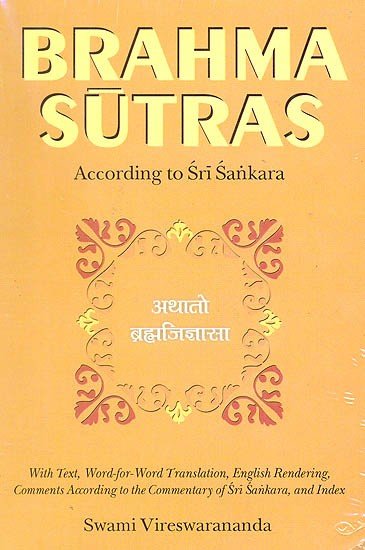Brahma Sutras (Shankara Bhashya)
by Swami Vireshwarananda | 1936 | 124,571 words | ISBN-10: 8175050063
This is the English translation of the Brahma-sutras including the commentary (Bhashya) of Shankara. The Brahma-sutra (or, Vedanta-sutra) is one of the three canonical texts of the Vedanta school of Hindu philosophy and represents an early exposition the Vedantic interpretation of the Upanishads. This edition has the original Sanskrit text, the r...
Chapter III, Section II, Adhikarana III
Adhikarana summary: The selfsame soul returns from Sushupti
Brahma-Sutra 3.2.9: Sanskrit text and English translation.
स एव तु, कर्मानुस्मृति-शब्दविधिभ्यः ॥ ९ ॥
sa eva tu, karmānusmṛti-śabdavidhibhyaḥ || 9 ||
sa eva—The selfsame soul; tu—but; karma-anusmṛti-śabda-vidhibhyaḥ—on account of Karma, memory, scriptural authority, and precept.
9. But the selfsame soul (returns from Brahman after Sushupti) on account of work, memory, scriptural authority, and precept.
A qestion is raised here that just as when a drop of water has merged in the ocean it is difficult to pick it out again, so also when the Jiva has merged in Brahman it is difficult to say that the selfsame Jiva arises from It after Sushupti. So we have to take that some soul arises after Sushupti from Brahman. There can be no rule that the same soul arises from It.
The Sutra refutes this and says that the selfsame soul comes back after Sushupti for the following reasons:
- What has been partly done by a person before going to sleep, we find him finishing after he wakes up. If it were not the same soul, then the latter would have no interest in finishing what has been partly done by another.
- From our experience of identity of personality before and after sleep.
- From our memory of past events.
- From scriptural authority as in texts like, “Whatever these creatures are here, whether a tiger, or a lion, or a wolf, or a boar . . . that they become again” (Chh. 6 . 9. 3), we find that the selfsame soul returns from Brahman after Sushupti.
- If the person who goes to sleep and he who rises after it be different, then scriptural precepts either as regards work or knowledge would be meaningless. For if a person can attain identity for ever with Brahman by merely going to sleep, then scriptural instruction would be useless to attain Liberation.
Therefore it is the selfsame soul that rises from Brahman after Sushupti. The case of the drop of water is not quite analogous, for a drop of water merges in the ocean without any adjuncts and so is lost for ever; but the Jiva merges in Brahman with its adjuncts. So the identical Jiva rises again from Brahman owing to its Karma and ignorance, which do not allow it to be lost in Brahman irrevocably.
